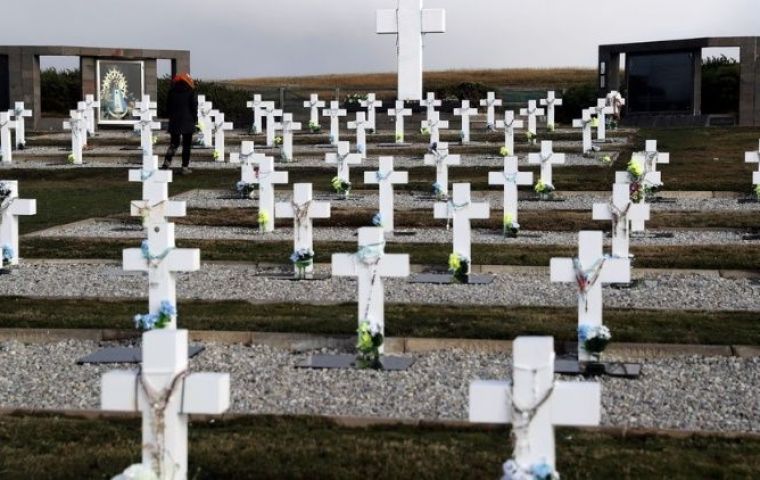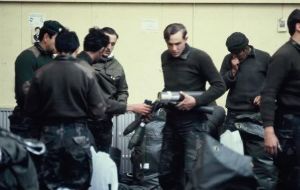MercoPress. South Atlantic News Agency
Argentine military cemetery in Falklands now has 102 identified gravestones
 The identification of Sbert is the result of the Humanitarian Project Plan agreed between Argentina, UK and Falklands, under Red Cross leadership
The identification of Sbert is the result of the Humanitarian Project Plan agreed between Argentina, UK and Falklands, under Red Cross leadership  Corporal Mateo Antonio Sbert, who fell in combat on 31 May 1982, has become the 102 combatant whose remains have been identified
Corporal Mateo Antonio Sbert, who fell in combat on 31 May 1982, has become the 102 combatant whose remains have been identified  “I met and talked with Maximiliano, the son of Mateo. It was very emotive, poignant to have him next to me...” said Claudio Avruj
“I met and talked with Maximiliano, the son of Mateo. It was very emotive, poignant to have him next to me...” said Claudio Avruj Argentina's Human Rights Secretariat announced on Tuesday that the remains of another Argentine unknown combatant, buried in the Falkland Islands have been identified making him the 102nd successful case. Corporal Mateo Antonio Sbert, was born in the province of Buenos Aires in 1949, and fell on 31 May 1982, during the South Atlantic conflict, in combat against British commandos at Top Malo House. He belonged to the Engineers Corps and was a Geographic Service graduate.
The identification of Sbert, and the ongoing process, is the result of the Humanitarian Project Plan agreed between Argentina, the UK and the Falklands, under the International Committee of the Red Cross, to give a name to the 124 graves at the Argentine military cemetery in Darwin, which until recently were only identified with a white cross and a black marble stone reading “Argentine soldier only known to God”.
“Having reached the 102 identification is the result of a meritorious task with the world that has extended us a hand, and is again dialoguing with Argentina”, said Claudio Avruj, Human Rights and Cultural Pluralism Secretary.
He added that “I met and talked with Maximiliano, the son of Mateo. It was very emotive, poignant to have him next to me and as the State to hand him an answer about his father.”
“We continue committed to this humanitarian mission which is helping us to heal old wounds, and from the State extend replies to the families of our heroes of Malvinas”, underlined Avruj.
According to Argentine reports the Top Malo House combat was a significant incident since it involved special forces from Argentina and the UK, which extended for over an hour.
The Argentine group belonging to the 602 Commando Company had taken refuge in the house for the night to protect themselves from a snow storm. Early morning the advancing British commandos under Captain Rod Boswell attacked the outpost, which ended with two combatants killed in each side and fourteen injured. Among the dead were Mateo Antonio Sbert and Lieutenant Ernesto Espinosa, who were awarded post mortem with the highest Argentine honor, medal to valor in combat.
Apparently the Top Malo House outpost was significant since it was the access to Fitz-Roy Bluff Cove.
The humanitarian identification plan under the guidance of the ICRC, involved a team of forensic anthropology experts that last year worked several weeks at the Argentine military cemetery in the Falklands. The process consisted of exhuming remains and taking DNA genetic samples and have them crosschecked, in several laboratories, with those of relatives who volunteered for the testing. Argentina's Forensic Anthropology Team has played a leading role since they are considered top class internationally given the painful experience collected having to identify the remains of thousands of victims of military dictatorships.
The Argentine government of president Mauricio Macri has pledged that the humanitarian process will continue until all remains are identified and the last black gravestone carries a full name.
The Argentine military cemetery in Darwin holds 237 graves of which 124 were unidentified until the current humanitarian plan was implemented. Now 22 are still waiting for identification.




Top Comments
Disclaimer & comment rules-

Read all commentsGoing to be embarrassing if they find more than are supposed to be there.
Nov 01st, 2018 - 11:29 pm 0Commenting for this story is now closed.
If you have a Facebook account, become a fan and comment on our Facebook Page!